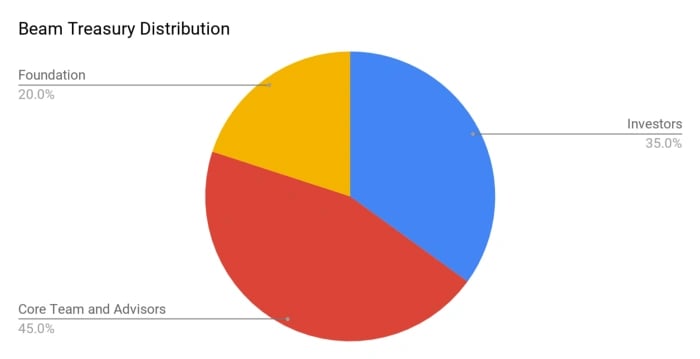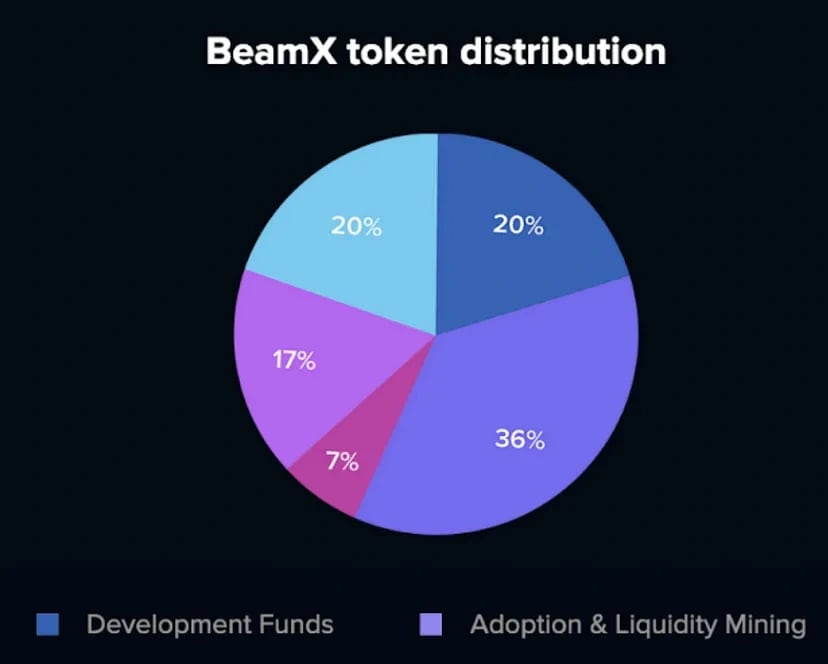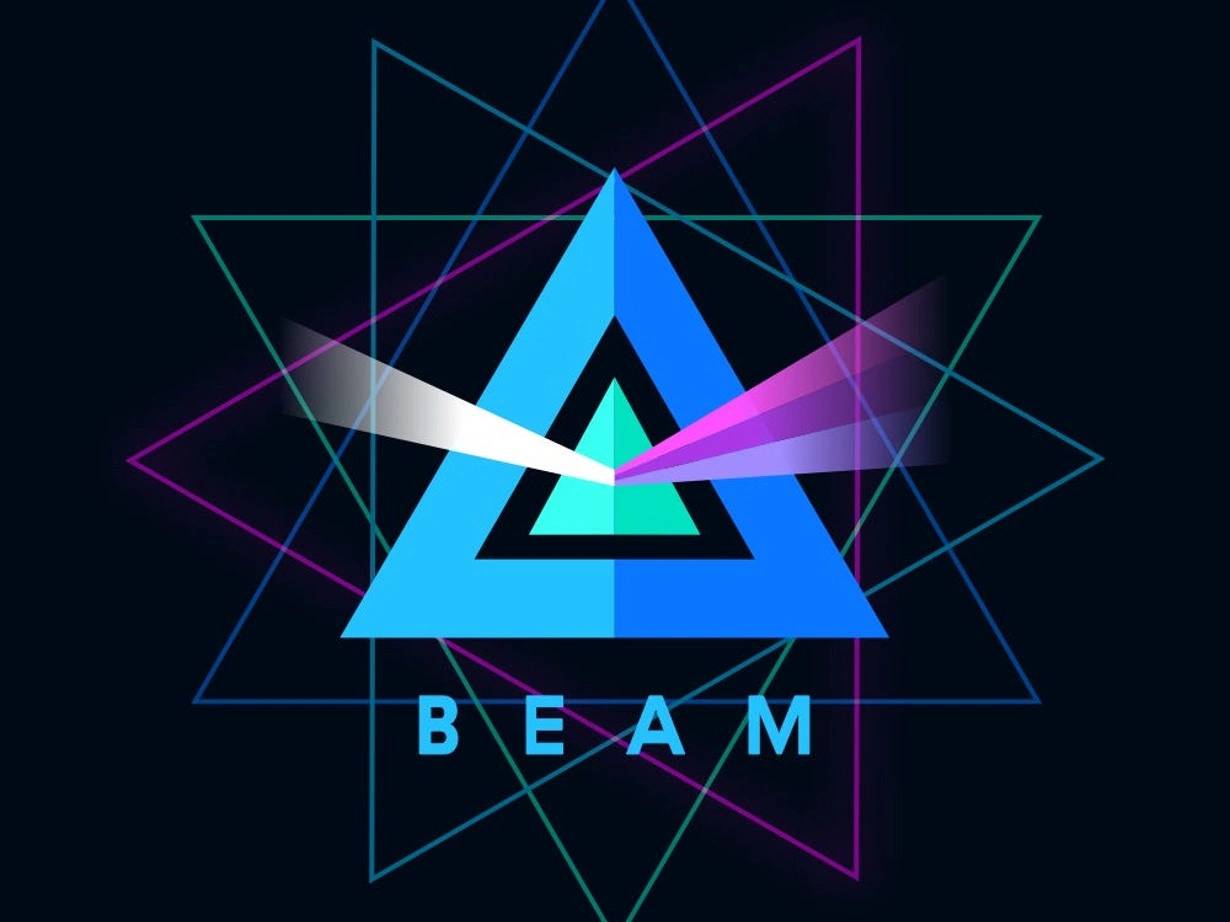Subscribe to wiki
Share wiki
Bookmark
Beam
The Agent Tokenization Platform (ATP):Build autonomous agents with the Agent Development Kit (ADK)
0%
Beam
Beam is a decentralized finance (DeFi) blockchain powered by the BEAM token focusing on privacy-by-default transactions and confidentiality. It hides wallet and transaction metadata by applying privacy protocols such as Mimblewimble, Lelantus-MW, and Dandelion. [1][2]
Beam was founded by Alexander Zaidelson (former CEO), Yoni Ben-Shimon, Alex Romanov (CTO), and Amir Aaronson (COO).
Overview
Beam launched in March 2018 with a primary focus on privacy. It uses Mimblewimble to ensure confidential transactions. This approach helps to improve scalability, reduce blockchain bloat, and enhance fungibility without relying on a trusted setup. Beam uses a proof-of-work model with the Equihash algorithm, incorporating periodic halving and an initial treasury emission for long-term sustainability. The platform includes research in Confidential Transactions, Bulletproofs, and Dandelion++ to address privacy and scalability issues. It also supports features like time-locked transactions and atomic swaps. [2]
Beam operates under the non-profit Beam Foundation, and it distinguishes itself by avoiding any initial coin offering (ICO) or pre-mining. To sustain its core team and foundation, the project relies on a block reward system where a specific percentage of coins is generated with each newly mined block.
Beam Privacy
Beam Privacy is a platform for users to generate, transact, and exchange digital assets on the Beam blockchain. It supports confidential DeFi and NFTs, employing blockchain technology for innovative financial and creative activities. Users can create diverse digital assets, such as stablecoins, tokens, or NFTs, and execute transactions securely on the Beam blockchain. The platform enables bridging assets from other blockchains like Bitcoin, Ethereum, Litecoin, and more. Beam Privacy features a decentralized exchange (DEX) utilizing an automated market maker (AMM) model akin to Uniswap, providing cost-effective transactions and enhanced liquidity. The DEX supports atomic swaps, enabling cross-chain exchanges without intermediaries. Moreover, Beam Privacy allows users to deploy and execute smart contracts using the WebAssembly (WASM) standard, offering a flexible and user-friendly framework for decentralized applications (dApps). [3]
BEAM Token
BEAM coin serves as the native cryptocurrency of the Beam blockchain, playing an important role in covering transaction fees, ensuring network security, and engaging in the governance and ecosystem activities within Beam Privacy. With a fixed supply of 262.8 million, BEAM coin is emitted through a PoW mining process, starting at 100 BEAM per block and halving annually until the fifth year, then stabilizing at 25 BEAM per block. Privacy is a key feature, employing the Mimblewimble and Lelantus protocols for transaction anonymity. Users can opt for standard or maximum privacy transactions. The coin plays a vital role in the Beam Privacy ecosystem, serving functions like covering transaction fees, staking for rewards in the Beam DEX and BeamX DAO, and creating/managing assets on the blockchain. Additionally, 20% of block rewards contribute to the Beam Treasury for project development until January 2024. [3]
Token Distribution

- Investors: ~35%
- Beam Core Team and Advisors: ~45%
- Beam Foundation: 20% (Biggest single beneficiary). [2]
BeamX
On November 19th, 2020, Beam launched BeamX, a DeFi layer with smart contract capabilities integrated into the Beam blockchain. It introduced a DeFi ecosystem prioritizing privacy by default and maximum confidentiality. The system uses the BEAMX token and is governed by the BeamX DAO, encompassing elements for a DeFi environment focused on privacy and confidentiality. [4][5]
BeamX DAO
The BeamX DAO is a self-governed community in the BeamX DeFi ecosystem using the BEAMX governance token. Beamer community members, including developers and users, can propose and vote on ecosystem changes using a dedicated governance DApp in the BeamX wallet. The voting cycle occurs roughly every two weeks. As part of decentralization efforts, Beamer community members will gradually gain voting power using the BeamX governance token, with all voting details kept confidential, as Beam does not store such information on the blockchain. [4]
BeamX DAO Voting
The BeamX DAO Voting DApp enables community members to engage in Beam's democratic governance and decision-making processes. This Voting DApp functions as an on-chain ballot for proposals created by the community, recording votes and the ultimate decision outcomes. Participants can vote by staking the BEAMX governance token, receiving voting power corresponding to their stake in the voting pool. To ensure complete decentralization, the design of the Voting DApp gives the community the authority to determine Beam's direction. [4]
Ecosystem
The BeamX Confidential DeFi ecosystem was designed for users to explore and for developers to create DAPPs within the BeamX ecosystem. For users, BeamX offers various features, including a dedicated DAPP store and the pre-built Faucet DAPP, providing small amounts of free BEAM to engage with the BeamX ecosystem. [4]
Beam Wallet
The Beam Wallet is a central component within the BeamX private DeFi ecosystem. Each wallet has an integrated DApp store containing various pre-installed decentralized applications (DApps). These include an Asset Minter, an NFT Marketplace, DAO Governance, Beam Anonymous Naming Service (BANS), and others. [4]
Atomic Swap
Beam incorporates an Atomic Swap functionality, allowing for decentralized peer-to-peer trading between Beam and various cryptocurrencies such as Bitcoin, Ethereum, Litecoin, and DOGE. This feature eliminates the need for an exchange or any third-party intermediary, emphasizing decentralization, censorship resistance, and adherence to fundamental cryptocurrency principles. To facilitate user accessibility, Beam has integrated an Atomic Swap marketplace directly into its wallets. [6]
BEAM Faucet
The Beam Faucet DApp enables users to receive small amounts of free $BEAM for conducting network transactions. A recent update to the Faucet includes support for all confidential assets, allowing developers to create faucets for their token projects easily. The Faucet DApp serves as a way for the community to explore the BeamX DeFi ecosystem freely. Each faucet withdrawal provides 0.5 $BEAM, which is suitable for over 400 transactions. [4]
Beam Anonymous Naming Service (BANS)
Inspired by Ethereum Naming Service (ENS), Beam Anonymous Naming Service (BANS), launched on August 16th, 2022, allows users to establish a customized decentralized identity for asset trading on the Beam blockchain. Transaction metadata remains confidential and is known solely to the involved parties. BANS offers a user-friendly means of naming Beam wallets, known as BANS ID, which requires a minimum of three alphanumerical characters and the ".beam" ID tag. [4][7][8]
Beam Asset Minter
The Beam Asset Minter DApp allows users to create customized, confidential assets, similar to privacy tokens, on the Beam blockchain using a straightforward no-code interface. The Asset Minter provides customization options, enabling creators to design unique assets for various purposes. Confidential assets (CAs) are minted through a decentralized smart contract, eliminating the need for intermediaries and poised for secure and anonymous transactions on the Beam blockchain. [4]
BEAM NFT Gallery
The introduction of the Beam NFT Gallery in 2021 created a new phase for non-fungible token (NFT) privacy, enabling users to transfer and store their unique digital assets confidentially. Unlike conventional NFTs on Ethereum or Binance Smart Chain with public metadata accessible to anyone, confidential NFTs on Beam ensure privacy by anonymizing ownership and concealing all metadata. The Gallery provides the Beamer community with a secure native NFT marketplace. As bridge capabilities changed, with support for various token types and connections to the broader blockchain ecosystem, users could bridge NFTs from any EVM-compatible blockchain (Ethereum, Avalanche, BSC, etc.) for private storage and transfers on the Beam blockchain. [4]
Nephrite
Nephrite is a private stablecoin on the Beam blockchain, designed to resist censorship, operate without custody, and lack governance. It is pegged to the USD and backed by excess BEAM collateral. The community-driven decentralized privacy stablecoin allows crypto users to anonymously mint and store stablecoins, fulfilling the desires of those seeking privacy in stablecoin transactions. Nephrite is minted without the involvement of intermediaries and adopts a protocol architecture akin to Liquity ($LQTY) on Ethereum. Nephrite contributes to the decentralized exchange (DEX) by enabling the creation of stablecoin trading pairs and establishing deep liquidity pools for yield rewards. [4][9]
Beam DEX
Introduced in May 2023, the Beam DEX facilitates swift, cost-effective, and private token exchanges on the Beam blockchain. Leveraging Beam's privacy protocols, the DEX conceals transaction metadata, providing resistance against common DEX attacks that capitalize on publicly accessible data. This includes protection against MEV, front-running, and sandwich attacks. With an average speed of 17 transactions per second through the high-frequency transactions (HFTX) mechanism, transactions on the Beam DEX are both rapid and economical, requiring only 1 $BEAM for over 800 token swaps. [10]
Beam Messenger
Beam Messenger uses Beam's privacy protocols to provide an anonymous messaging experience. Functioning as a smart contract on the blockchain, Beam Messenger establishes a local peer-to-peer connection between users' Beam Wallets. This decentralized Messenger operates independently of web front ends, offering users an inclusive, secure, and censorship-resistant means of communication and idea exchange. [4]
Beam Bridge
Launched in March 2023, Beam Bridge is a bidirectional connection between Beam and Ethereum, facilitating cross-chain asset transfers. The bridge DApp establishes a link between Beam's private DeFi (PriFi) and Ethereum's extensive token ecosystem, accommodating assets such as $ETH, $DAI, $WBTC, and $USDT. The open-source bridge is transportable and adjustable, allowing developers to customize and operate it for any EVM-compatible blockchain. [4][11]
BEAMX Token
BEAMX serves as the DAO governance token for the BeamX DeFi platform. Users can acquire BEAMX by engaging in DAO activities, contributing liquidity to DeFi applications under DAO governance, or participating in the governance procedures. Additionally, users have the option to farm BEAMX by staking BEAM tokens. [2][4]
Token Distribution

- Adoption & Liquidity Mining: 36%
- Investors: 20%
- Development Funds: 20%
- Foundation: 17%
- Ecosystem Partners: 7% [2][4]
Funding
On May 20th, 2021, Beam, a privacy-focused layer one blockchain, secured 2 million USD in funding to pioneer confidential features in the DeFi sector. This financial support drove the development of private DeFi components like Automated Market Makers (AMM), Liquidity Pools (LP), staking mechanisms, algorithmic stablecoins, and more. The initial funding round attracted participation from various institutional and individual investors, including Collider Ventures, Altonomy, LionsChain, Alternity Capital, and more. [12]
Partnership
Nostr
In August 2023, Beam Privacy partnered with Nostr, an open-source, anonymous, and censorship-resistant communication protocol. This collaboration led to the BeamxNostr Summer Hackathon 2023, a global event encouraging developers to craft innovative decentralized applications (dApps) by leveraging the technologies of both Beam and Nostr. [3]
Chainlink
In September 2023, Beam Privacy integrated with Chainlink, a prominent decentralized oracle network offering secure and reliable data feeds to smart contracts. This integration empowered Beam Privacy to access diverse external data sources, including market prices, weather data, sports scores, etc. Using such data became feasible within Beam Privacy's smart contracts and decentralized applications (dApps). [3]
Polygon
In October 2023, Beam Privacy established a bridge with Polygon, a scalable and interoperable framework for constructing and linking Ethereum-compatible blockchain networks. This bridge facilitated Beam Privacy's entry into Polygon's extensive and varied ecosystem, encompassing DeFi, NFT, and gaming platforms. As a result, Beam Privacy users gained access to a broader array of options and possibilities within the Polygon network. [3]
See something wrong?
The Agent Tokenization Platform (ATP):Build autonomous agents with the Agent Development Kit (ADK)
